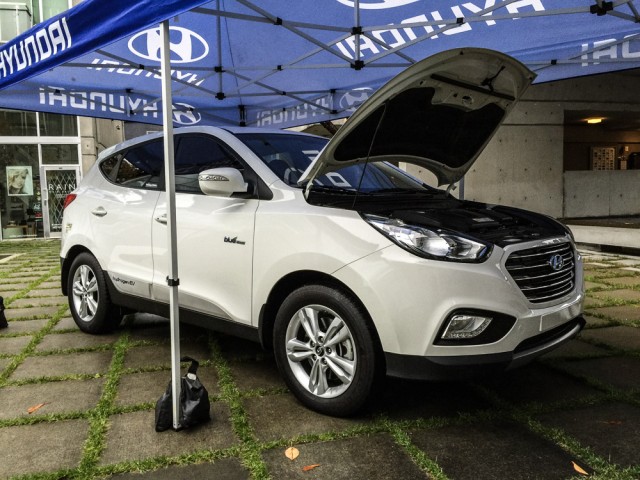Hyundai Tucson FCEV: first production fuel cell car in Canada


British Columbia is a recognized world centre for hydrogen and fuel cell technology. Government officials find hydrogen a particularly attractive power source as it is a near-zero emission solution that will help the province meet its greenhouse gas reduction targets.
Canada’s hydrogen and fuel cell industry has invested over $1 billion into research and development, with the majority of this funding going to B.C.-based companies.
Last week, Korean auto manufacturer Hyundai announced that they would be the first company to offer Canadians access to having a hydrogen fuel cell vehicle in their households.
For $599 per month, Hyundai Canada will lease customers a Tuscon Fuel Cell Electric Vehicle (FCEV). This 36-month lease includes a 20,000 kilometre limit per year, which is about the average distance most Canadians drive in a year. Unlimited maintenance and hydrogen refuelling will also be bundled into the monthly cost.
In addition, Tucson FCEV owners will enjoy an “At Your Service” valet program. Based on the company’s full-size Equus premium sedan program launched in 2010, should a Tucson FCEV require any service, a Hyundai dealer will pick up the vehicle and provide a loaner hybrid vehicle. They will then return it after service is complete to their home or business, at no charge.
Why an SUV?
“The compact SUV segment is currently the hottest segment in the auto industry right now. It’s a great vehicle for every day Canadian use,” says Don Romano, president and CEO of Hyundai Canada.

Hyundai began its fuel cell research and development in the 1990s with the aim of protecting the global environment and leading the industry with environmental technology. In 2000, it successfully created a hydrogen fuel cell vehicle that performed comparably to internal combustion engines.

After years of development, the Hyundai Tucson FCEV – with the company’s latest-generation fuel cell stack – became the world’s first mass-produced hydrogen fuel cell vehicle in 2013.
Hyundai Canada is offering the vehicle in only one well-equipped trim level with all of the amenities, including heated seats and a GPS satellite navigation. There is virtually no extra space taken up by the fuel cell stack, so cargo and passenger capacity are unaffected.

“Since the Tuscon FCEV is produced in the same factory and on the same line as the regular Tuscon, we can leverage economies of scale and adjust production capabilities to meet demand,” says Ramano.

Why hydrogen and not battery power?
Hyundai says that the company believes that a fuel cell stack is better than a battery since it produces its own power. With an estimated range of 426 kilometres per tank, the fuel cell equipped Tuscon also exceeds most battery-powered pure EVs currently on the market.

Moreoever, rather than hours of battery charging time, the fuel cell Tuscon only requires less than 5 minutes to refuel at a hydrogen station. Hyundai believes that the fuel cell solution eliminates the range anxiety or recharge time compromises of battery electric vehicles.

Romano added, “We are proud to be leading the fuel cell movement and now is the time for auto companies, governments, and citizens to join us in this initiative and push for the creation of a hydrogen infrastructure in Canada to maintain this positive momentum.”
Can the fuel cell cope with Canadian winters?
Even though the initial launch of the Tuscon FCEV will be in Vancouver, the Tuscon FCEV is currently already available to customers in many countries including the USA, the UK, Germany, France, Belgium, Italy, Austria, Netherlands, Denmark, Sweden, Norway, Finland, and South Korea.

Hyundai executives provided assurances that the Tucson FCEV has undergone extensive crash, fire and leak testing. Furthermore, cold weather has proven to have minimal effects to the Tucson FCEV driving range when compared to battery electric vehicles.
How can I get a Tuscon FCEV?
Hyundai Canada is taking applications from customers exclusively through a dedicated website at www.HyundaiHydrogen.ca.

As there are only a limited number of hydrogen fueling stations, the selection process will consider the applicants’ proximity to Powertech Labs in Surrey B.C. that Hyundai has chosen to partner up with.
The automaker also says they will work with the Canadian government at all levels to better improve infrastructure, the lack of which has traditionally deterred manufacturers from offering a hydrogen-powered car in North American markets.

“Fuel cell vehicles have the potential to make a huge, positive impact on the environment and climate change,” said Eric Denhoff, president and CEO of the Canadian Hydrogen and Fuel Cell Association. “Hyundai’s commitment to hydrogen power proves that it is time for us to take the next step and make the fuel cell dream a reality in Canada by expanding hydrogen infrastructure, making fuel cell vehicles the most popular and accessible vehicles for Canadians.”


